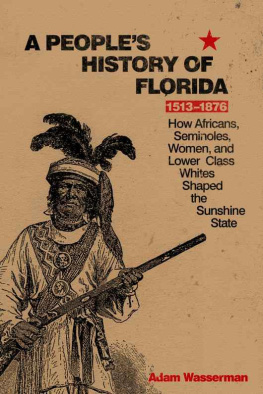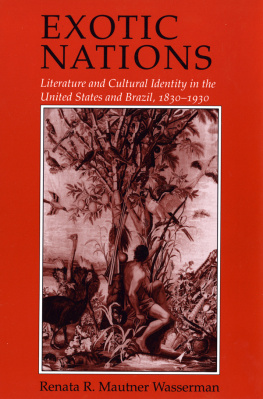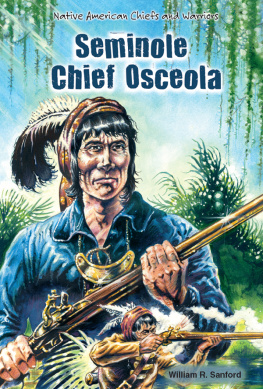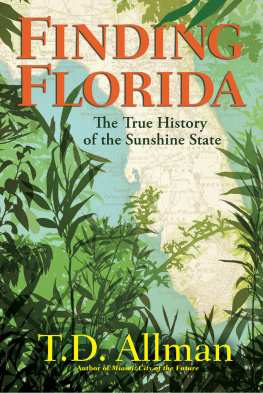Wasserman - A Peoples History of Florida 1513-1876: How Africans, Seminoles, Women, and Lower Class Whites Shaped the Sunshine State
Here you can read online Wasserman - A Peoples History of Florida 1513-1876: How Africans, Seminoles, Women, and Lower Class Whites Shaped the Sunshine State full text of the book (entire story) in english for free. Download pdf and epub, get meaning, cover and reviews about this ebook. year: 2013, genre: Politics. Description of the work, (preface) as well as reviews are available. Best literature library LitArk.com created for fans of good reading and offers a wide selection of genres:
Romance novel
Science fiction
Adventure
Detective
Science
History
Home and family
Prose
Art
Politics
Computer
Non-fiction
Religion
Business
Children
Humor
Choose a favorite category and find really read worthwhile books. Enjoy immersion in the world of imagination, feel the emotions of the characters or learn something new for yourself, make an fascinating discovery.
- Book:A Peoples History of Florida 1513-1876: How Africans, Seminoles, Women, and Lower Class Whites Shaped the Sunshine State
- Author:
- Genre:
- Year:2013
- Rating:3 / 5
- Favourites:Add to favourites
- Your mark:
- 60
- 1
- 2
- 3
- 4
- 5
A Peoples History of Florida 1513-1876: How Africans, Seminoles, Women, and Lower Class Whites Shaped the Sunshine State: summary, description and annotation
We offer to read an annotation, description, summary or preface (depends on what the author of the book "A Peoples History of Florida 1513-1876: How Africans, Seminoles, Women, and Lower Class Whites Shaped the Sunshine State" wrote himself). If you haven't found the necessary information about the book — write in the comments, we will try to find it.
Wasserman: author's other books
Who wrote A Peoples History of Florida 1513-1876: How Africans, Seminoles, Women, and Lower Class Whites Shaped the Sunshine State? Find out the surname, the name of the author of the book and a list of all author's works by series.
A Peoples History of Florida 1513-1876: How Africans, Seminoles, Women, and Lower Class Whites Shaped the Sunshine State — read online for free the complete book (whole text) full work
Below is the text of the book, divided by pages. System saving the place of the last page read, allows you to conveniently read the book "A Peoples History of Florida 1513-1876: How Africans, Seminoles, Women, and Lower Class Whites Shaped the Sunshine State" online for free, without having to search again every time where you left off. Put a bookmark, and you can go to the page where you finished reading at any time.
Font size:
Interval:
Bookmark:
No part of this book may be reproduced in any form or by any electronic or mechanical means including information storage and retrieval systems, without permission in writing from the author. The only exception is by a reviewer, who may quote short excerpts in a review.
Adam WassermanVisit the authors website at www.adamwasserman.org.Printed in the United States of AmericaFirst Printing: May 2009ISBN-13 978-1-4421670-9-4 Special Dedication: For my love Tamara McCoy, I couldnt have garnered the motivation for this project without your everyday love, encouragement, and support. For my family members and friends who all contributed and provided inspiration in their own unique ways.
Acknowledgements: Howard Zinn and various other Peoples History authors who continue to challenge traditional historical narratives. Marcos Solis, my cover designer, for his great work in making this project happen. Much appreciation for the inspiration provided by J.R. Birds fantastic website Rebellion: John Horse and the Black Seminoles, the First Black Rebels to Beat American Slavery . For every reader and editor who has given me some form of feedback and contributed to this project.
Adam Wasserman is a native resident of Sarasota, Florida. Inspired by the Peoples History series and other critical historical texts, he has determined to base his writing career on revisionist history, social change, and global issues afflicting the world today. After reading numerous Peoples History renditions and relentlessly studying the primary source narratives of people marginalized by traditional history books, Adam decided to derive a comprehensive, revisionist history of where he was born and raised.
A Peoples History of Florida 1513-1876 How Africans, Seminoles, Women, and Lower Class Whites Shaped the Sunshine State 4thEdition
Contents
Manifest Destiny, Land Theft, and Slavery Expansion / 131The First Seminole War:
The Real 300 Was At the Suwannee River / 175Containment and Enslavement:
Whites Expand Their Hold of the Florida Territory / 206The Discontent:
General Slave Resistance in Antebellum Florida / 361Slavery with a Human Face:
The Postwar Struggle over Land, Labor, and Freedom / 468References / 571
The mainstream history taught in school curriculums, relayed in the media and in politics, is not objective in the sense that it has no social agenda. Indeed, as mainstream history is increasingly challenged on all sides from critical historians, political activists, students, and everyday people, history itself is becoming a battleground for social conflict. As Howard Zinns A Peoples History of the United States grows in popularity and new, critical viewpoints of history become more prevalent, its only logical that the more orthodox, sanitized, and patriotic vision of history is being pushed harder in the classrooms, the media, and politics. In recent years, particularly since the 1960s and 70s, history has taken a turn from the past great men theory of history that only credited governments and leaders to covering a wider range of people and differing experiences. History is no longer the monopoly of the upper-crust, a mere one to five percent of the population, but the contribution of the population as a whole and their differing experiences, perspectives, and struggles. Common people had to fight toothand-nail to shift the lens of history from the top to the bottom. But others interested in ensuring that mainstream history simply relays the official viewpointare seeing to it that these gains are reversed. Seeking to turn back US history to a national history, the class, race, and gender conflicts that have shaped US history are now being marginalized for the viewpoints and actions of leaders and governments.
As Florida teeters on the brinking point of a failed state, its not surprising that creative outlook, alternative perspectives, or any sort of analysis outside of the orthodox framework are being forced out and excluded from classrooms. The Florida state legislature is at the forefront in protecting the rigid foundations of public education. With a diminishing budget, overcrowded classrooms, teacher layoffs, and crumbling infrastructure, the Florida legislature has taken measures to institute a more rigid, rudimentary education system, ensuring that education reciprocates class relations in an ever more unequal system. In 2006, Governor Jeb Bush approved a law barring critical history in Florida public schools. American history shall be viewed as factual, not constructed, shall be viewed as knowable, teachable, and testable, declares the Education Omnibus Bill. Neither Bush nor the Florida legislature has probably ever sat and pondered whether the official, factual viewpoint they are imposing was itself constructed. The bill continues: [American history] shall be defined as the creation of a new nation based largely on the universal principles stated in the Declaration of Independence.
A Peoples History of Florida does not teach the history, meaning, significance and effect of the provisions of the Constitution of the United States and the amendments thereto, as according to the provisions of the Education Omnibus Bill. It does not emphasize flag education, including proper flag display and flag salute or the nature and importance of free enterprise to the United States economy. The importance of free enterprise in US history would surely not be emphasized in schools or the media if we were to shift the perspective from the JP Morgans, Carnegies, and the Rockefellers (or, in Floridas case, Rockefeller associate and railroad magnate Henry Flagler) to the railroad and steel workers who lost their limbs in heavy machinery with no compensation, worked and died in diseased conditions, were killed and sometimes massacred by police, militia, and hired thugs, denied the right to organize a union, paid starvation wages, forced to work additional unpaid hours on top of their average work day of ten to twelve hours, etc.
all to build the wealth of a handful of capitalists. We never hear about the importance of free enterprise in US history in this aspect. This book instead encourages readers to think about the people who stood on the opposite side of Americas dominant institutions capitalism, imperial expansion, white supremacy, and patriarchy- about how these institutions were expanded or limited by struggle. While masquerading itself as nonideological, the very assumptions underlying these fundamental institutions are subtly ingrained in mainstream US history. By excluding the struggles, perspectives, and experiences of those who have stood on the receiving end of these institutions, traditional US history has made itself the ideology of the victors. This top-down viewpoint shows how elites have shaped history with their acts, wars, policies, and beliefs, but gives little time to the various ways that the majority of people reacted, whether through protest, petition, revolt, defiance, or quiet resentment. Continuing the great men theory, military generals, Presidents, politicians, and wealthy elites are seen to be the only ones who have shaped history, ignoring the popular undercurrents that contribute highly to significant social and economic change and the systems that marginalize large portions of the population.
Thus we turn to the bottom when we look at the foundations of this nation. The foundations of the US were not the Declaration of Independence or the Constitution, as says the Education Omnibus Bill, but the ethnic cleansing, dispossession, and extermination of its native inhabitants, the enslavement and exploitation of Africans, the destitute conditions of millions of working class white men, and the general oppression of women across racial and class lines. Their labor, conflicts, struggles, experiences, and pains define US history for the vast majority of people. At its very fundamental core, the history of the US has been not been one national community, but of conflict across class, race, and gender lines. There is no such as a unified nation-state, and therefore its impossible to cover the entire range of any national history from a general perspective. Varying experiences of upper and lower class, of white and black, of men and women, of oppressor and oppressed, need to be considered. The US itself was formed out of the drive to establish the white mans domain. The conflict and resistance that arose to challenge wealthy white male hegemony is what truly shaped the creation of the United States over the eighteenth and nineteenth centuries. As will be elaborated in chapters 3 and 4, the very formation of US boundaries, particularly in Florida, were based on blatant disregard for international and constitutional law, the dispossession and suppression of indigenous people, and the expansion of slavery. Efforts of common people to resist this encroachment on their liberty were what defined the outcome.
Font size:
Interval:
Bookmark:
Similar books «A Peoples History of Florida 1513-1876: How Africans, Seminoles, Women, and Lower Class Whites Shaped the Sunshine State»
Look at similar books to A Peoples History of Florida 1513-1876: How Africans, Seminoles, Women, and Lower Class Whites Shaped the Sunshine State. We have selected literature similar in name and meaning in the hope of providing readers with more options to find new, interesting, not yet read works.
Discussion, reviews of the book A Peoples History of Florida 1513-1876: How Africans, Seminoles, Women, and Lower Class Whites Shaped the Sunshine State and just readers' own opinions. Leave your comments, write what you think about the work, its meaning or the main characters. Specify what exactly you liked and what you didn't like, and why you think so.










